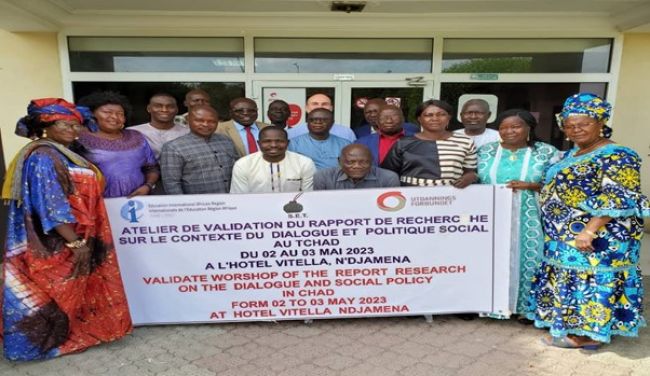La coopération au développement pour renforcer le dialogue social et le dialogue politique efficaces au Tchad
L'Internationale de l'Education promeut l'application des normes de internationale du travail, y compris la liberté d'association et le droit de s'organiser, de négocier collectivement et d'entreprendre des actions syndicales, y compris des grèves, si nécessaire. L'IE soutient également le droit des enseignant.e.s et des organisations d'employé.e.s de l'éducation à participer à la formulation et à la mise en œuvre des politiques éducatives aux niveaux national et international.
Dans le cadre de la coopération au développement, l'IE et le SET/Tchad, avec le soutien de UEN/Norvège, ont commandité une étude afin analyser le contexte du dialogue social et politique au Tchad. L'étude visait à mieux comprendre les forces structurelles, politiques et socio-économiques qui influencent les possibilités des syndicats d'enseignant.e.s de s'engager dans le dialogue social et politique au Tchad, en vue d'influencer les politiques éducatives et de faire progresser les droits des travailleurs. Cette initiative conjointe sur l'un des mandats principaux de l'Internationale de l'Education est en parfaite harmonie avec son principe de " bâtir la solidarité et de la coopération mutuelle entre les organisations membres", qui contribuera à développer les capacités du SET/Chad à assumer sa position en tant qu'acteur clé du dialogue social et politique dans le pays.
Un atelier de validation réunissant des représentant.e.s du syndicat norvégien de l’éducation, UEN/Norvège, de l'IE Afrique et du SET/Chad a été organisé du 2 au 3 mai 2023 afin d'examiner les résultats et les recommandations de la recherche et de s'assurer qu'ils reflètent les réalités du terrain.
L'étude a révélé que le Tchad connaît une instabilité politique depuis son indépendance en 1960, qui a affecté et continue d'affecter le développement du système éducatif, caractérisé par une faible capacité d'adaptation et d'innovation en réponse à de nouveaux problèmes. Elle a également souligné que depuis 2009, un cadre institutionnel de dialogue national tripartite impliquant le gouvernement, les employeurs et les syndicats a été mis en place pour assurer la modération des négociations et le suivi des engagements pris à travers les différents protocoles, mais son efficacité reste à démontrer. En effet, ce dialogue n'a pas toujours systématiquement abouti à la mise en œuvre des décisions. Par conséquent, le renforcement des mécanismes de dialogue social et politique au Tchad demeure très pertinent afin d'accroître la capacité de l'organisation membre de l'IE dans le pays à remplir efficacement son mandat dans le dialogue sur les politiques et les conditions de travail décentes.
L'analyse du contexte de dialogue social et politique au Tchad est en parfaite adéquation avec le cadre de l'IE Afrique sur le dialogue social adopté par le Comité régional de l'IE Afrique en 2022, qui cherche à encourager la création d'un climat propice aux relations de travail, à la politique et au dialogue social, y compris la négociation collective, dans le but ultime de parvenir à un travail décent pour les éducat.rics.eurs et à une éducation de qualité.

[Mon, 15 May 2023 16:04:00 +0000] | DIGG THIS
Internationale de l’Education · No. 3 Torshie Close, Mempeasem · East Legon Extension · Accra · Ghana
Phone: +233.302.50.12.00 · Fax: +233.302.50.66.81 · Email: eirafoffice@ei-ie.org
Website Development and Design by Cyblance
